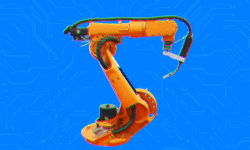The energy industry—encompassing sectors like oil and gas, renewable energy, and utilities—plays a critical role in powering economies and societies around the world. Decision-making within the space has traditionally relied on expert knowledge, historical data analysis, and complex modeling techniques.
However, the advent of generative artificial intelligence (genAI) has brought about a significant shift in the industry. With its ability to analyze vast amounts of data, generate accurate models, and much more, this iteration of AI is revolutionizing the way business is being conducted.
Like never before, professionals can gain instant insights, make more data-driven decisions, and consequently, take the lead in their respective sector with the help of genAI.
According to McKinsey, “many companies are now moving beyond straightforward use cases and taking increasingly innovative approaches to adopting genAI, and estimates show that an additional $390 billion to $550 billion of value can be created in the years to come.”
Recent utilities-specific data suggests that the current market for genAI services in the industry stands at $534M and will grow to $8.6B by 2032—a CAGR of more than 33%.

As industry tension brews due to resource scarcity tied to geopolitical tensions, energy companies are leveraging genAI to optimize operations, improve efficiency, and reduce costs—bringing them closer to a more data-driven business future, as well as a sustainable and secure energy landscape.
Below, we dive into exactly how genAI is being implemented within the energy industry, the potential risks it carries, and a future outlook on what leaders can expect from this technology.
Generative AI Use Cases in Energy
AI tools are becoming increasingly integral for energy businesses, offering automation for data analysis, forecasting, promoting sustainability, and so much more. The widespread adoption of AI is not merely a trend but a strategic shift that can foster innovation and drive success.
In our 2023 State of Gen AI & Market Intelligence report—which surveyed 500-plus professionals across various roles—a vast majority (over 80%) of respondents reported that they plan to leverage genAI tools in their research this coming year. Learn how energy professional can leverage this new technology below:
Reservoir Simulation and Modeling
Generative AI can be used in the energy industry to improve reservoir simulation and modeling. By analyzing large amounts of data, AI algorithms can generate accurate models of underground reservoirs, allowing energy professionals to make more informed decisions about drilling and production strategies.
According to Infosys BPM, genAI can “generate detailed production forecasts by simulating complex reservoir behavior under various conditions, leading to more efficient resource management. Further, it can “predict potential issues, like water encroachment or sand production, allowing for proactive measures to be taken while helping minimize downtime and maximize yield.”
Drilling Optimization
Leveraging internal drilling insights is crucial for energy companies seeking to optimize operations across multiple business segments. However, extracting this data from the copious amounts of data generated by drilling activities has historically posed a significant challenge for industry leaders. This data comes from diverse sources, including geological surveys, drilling operations, End of Well reports, and internal IT systems—making it all the more challenging to synthesize it into a digestible form of content. That’s where genAI comes in.
Generative AI models can be used to optimize drilling operations by analyzing various factors such as geological data, drilling history, and real-time sensor data. Further, AI algorithms can generate optimized drilling plans that minimize costs and maximize energy efficiency. And there’s already talk of how genAI chatbots are being leveraged to search for information from drilling and production reports and scientific articles.
In one case study, a genAI chatbot was integrated with an operator’s historical PDF drilling reports (Volve dataset), which traditionally are challenging to extract and analyze at scale. Several thousand drilling reports were extracted and stored in a database, and were then used to perform comparative analysis identifying wells with significantly higher non-production time (NPT) due to repair or fishing events.
In this way, a chatbot can compare one company’s well operational statistics with another well and generate various visuals which helps identify potential ways to improve drilling operations.
Carbon Capture
Leaders of the energy industry are quickly learning genAI‘s impact on potential sustainable initiatives, with KPMG reporting 43% of executives considering its potential for environmental monitoring and management. AI plays a pivotal role in fostering sustainable practices and ensuring compliance with ecological regulations by analyzing emissions data and supporting strategic, eco-friendly operational decisions.
However, a major challenge lies in acquiring detailed and comprehensive environmental data. The effectiveness of AI in carbon control hinges on the depth and quality of available datasets. Companies can improve data collection by investing in advanced sensors and IoT technology, which enable more accurate and diverse metrics.
This, in turn, allows businesses to leverage AI capabilities to enhance their environmental impact strategies. Moreover, the application of AI extends beyond the utilities industry; for instance, generative AI in the automotive sector holds promise for mitigating climate change. Embracing such innovations represents a significant stride towards a more sustainable and environmentally conscious future.
Supply Chain Optimization
AI-powered generative models can optimize the supply chain in the energy industry. By analyzing various factors such as demand patterns, transportation costs, and inventory levels, AI algorithms can generate optimized supply chain strategies. This helps energy companies reduce costs, improve efficiency, and ensure timely delivery of resources.
Based on a KPMG’s survey, 65% of executives in the energy, natural resources, and chemicals (ENRC) industries said genAI represents “a significant opportunity to drive efficiencies, while 63% believe it will deliver meaningful value to their organization.
And now AI has become integral to everything we do. We have rapidly augmented our talent and capabilities, embracing the latest in generative AI, and we are embedding AI into all our processes and offerings, creating end-to-end workflows with real-time data-driven insights and automation. This is helping us deliver smarter, more responsive services to both internal users and customers.”
– Reliance Industries Limited | Shareholder/Analyst Call
Renewable Energy Promotion
GenAI also plays a crucial role in managing the influx of new data resulting from the shift towards clean energy. This shift is exemplified by the rapid growth of distributed energy resources (DERs), which aim to decentralize and localize energy production. For instance, individuals can now sell excess energy generated by their rooftop solar panels back to energy providers. Similarly, companies are increasingly relying on local wind farms to generate their own power.
GenAI‘s ability to consolidate and analyze data will enable energy providers to explore new revenue streams. They can offer services such as leasing, maintaining, and upgrading solar panels or wind farm equipment. Moreover, establishing agreements to purchase unused consumer energy for cost-effective and sustainable power generation will be a key aspect of these new customer relationships.
According to IDC‘s projections, by 2026, half of the utilities in advanced markets are expected to allocate resources toward Advanced Distribution Management Systems or Distributed Energy Models. These investments aim to streamline the integration of renewable energy sources and distributed energy resources (DERs), reducing their carbon emissions by an estimated 30% in the long term. Similarly, Gartner researchers anticipate a significant acceleration in the deployment of renewable resources by utilities, communities, and investors by 2030, largely driven by the widespread adoption of DERs.
Workforce Safety and Risk Management
AI-powered generative models can be used to enhance workforce safety and risk management in the energy industry. By analyzing data from various sources such as sensors, cameras, and historical incident reports, AI algorithms can generate insights and recommendations to improve safety protocols and mitigate risks. This helps energy companies create a safer working environment for their employees.
According to Factor Lab, “generative AI is not just an innovation; it’s a transformative force that can empower you to enhance safety measures and create a safer work environment. By simplifying hazard recognition, automating pre-task planning, and streamlining safety communication, generative AI becomes your ally in ensuring safety excellence.”
Risks and Drawbacks of Generative AI
As genAI gains attention as a potential solution for workplace challenges and process optimization, concerns are emerging regarding its reliability, data security, and implementation complexity. Organizations are grappling with understanding the required investment and assessing whether the associated risks justify the effort. Professionals are noticing a significant gap between their expectations for genAI and the reality of its capabilities.
Trust and Transparency Concerns
One of the risks associated with generative AI is the lack of trust and transparency in the decision-making process. As AI algorithms generate outputs based on complex models, it can be challenging for users to understand how and why certain decisions are made. This lack of transparency can lead to skepticism and hinder genAI adoption—leaving more than 70% of the large companies Harvard Business Review surveyed wondering how to reap the potential benefits that AI can offer.
Data Security and Privacy Concerns
Generative AI relies heavily on large amounts of data for training and generating models. This raises concerns about data security and privacy. Energy companies need to ensure that the data used for generative AI is properly protected and that privacy regulations are adhered to. Failure to do so can result in data breaches and potential legal consequences.
Based on the Cisco 2024 Data Privacy Benchmark Study, a large percentage of organizations are limiting the use of generative AI (genAI) over data privacy and security issues. One out of four companies (roughly 27%) had banned its use, at least temporarily while 91% of businesses recognize they need to do more to reassure customers that their data is used for intended and legitimate purposes in AI.
Regulatory or Ethical Concerns
An genAI intelligence system relies on an algorithm to generate answers or make decisions. But how these results are produced brings into question bias, discrimination, and the role of human judgment.
In the case of leveraging AI to find workplace talent: if an algorithm is configured and deployed thoughtfully, AI resume-screening software should produce a wider pool of applicants for consideration and minimize the potential for human bias. However, some experts believe that AI mimics human biases, and further, relies on them to establish “scientific credibility”. In other words, artificial intelligence translates prejudice and judgment into objective truth—a mishap that, if unaddressed, could lead to the perpetuation of harmful prejudices, biases, .
Ultimately, the core of an unbiased algorithm starts with the content sets it’s based on. Vetting data sources that serve as the foundation for an AI system’s knowledge is critical to ensuring reliable results or decisions. Further, it is important to ensure that the sources comply with industry regulations and ethical standards, and therefore take appropriate measures to address these potential blunders.
High Upfront Costs and Technical Complexity
Not only is genAI one of the most important technologies business leaders should adopt in the next 12 months, but it has the potential to also be one of the most expensive. Building LLMs takes significant time, resources, and capital in order to effectively acquire, clean, and curate large data sets. Just for model training, you need computational resources (i.e., hardware, software, cloud services), ramping personnel, maintenance and updates, and so on.
The result of asking these hard questions leaves companies in a tough spot: they realize the potential positive impacts genAI can have on their business but implementing it is challenging. The classic “buy vs build” debate rages on within firms of all shapes and sizes. Exploring external solutions leads to questions about data security and data control, flexibility and customization, reliability and scalability, implementation times, and implementation costs. So it becomes crucial to understand why and how you’ll be using an LLM, so as to make the right decision about whether to build or buy.
The Future of Generative AI in Energy
Generative AI holds immense potential for transforming all energy sectors, promising a future where energy and utility corporations can harness the power of this technology to make more informed decisions, optimize operations, and improve overall efficiency. It provides a solution to a major obstacle the industry has faced for decades: an insurmountable, endless channel of data to analyze.
GenAI’s ability to not only analyze large amounts of data but provide insights based on this input can lead to optimized resource allocation, reduced costs, and enhanced productivity. While it is important to acknowledge the risks and drawbacks associated with generative AI, embracing this technology can help energy professionals stay ahead of the curve and unlock new opportunities for growth and sustainability in the ever-evolving energy landscape.
Whether it’s optimizing extraction processes, enhancing environmental sustainability, or improving workforce safety, the applications are limitless.The integration of generative AI in our IT functions marks just the beginning. We envision its adoption across various facets of our operations, paving the way for smarter, more efficient and innovative solutions that will propel our company to new heights.”
– DRDGold Ltd | Annual Reports, Annual Financial Results and Other Annual Filings
Staying Ahead of the Curve With AlphaSense
In a volatile market that’s producing new developments around genAI every day, it’s challenging to decipher what technology, product, or insight could revolutionize the energy industry next. Cutting through the noise to find insights is nearly impossible in the age of information overload. You need a tool that does all of the heavy lifting, so you can focus on leveraging information rather than searching for it.
AlphaSense is a leading provider of market intelligence, including 10,000+ high-quality content sources from more than 1,500 leading research providers—all in a single platform. Analysts, researchers, and decision-makers in the medtech sector can access exclusive research reports only found elsewhere in disparate locations and often behind expensive paywalls. With AlphaSense, companies can conduct comprehensive research that gives them a competitive edge with smarter, more confident decision-making.
Specific types of content you’ll find on the AlphaSense platform include:
- Company documents including event transcripts, FERC documents, global filings, press releases, company presentations, and ESG reports
- Over 1,500 research providers including Wall Street Insights®, a premier and exclusive equity research collection for corporate teams
- Tens of thousands of expert call transcripts with industry expert perspectives from customers, competitors, former employees, and partners
- Regulatory content including FERC documents and sites such as Energy Information Administration
- Over 3,000 curated news sources and trade publications including industry news, market news, and energy.gov
Our AI search capabilities enable accurate, fast, and comprehensive qualitative and quantitative research, and can mine unstructured data for the most critical insights. These features include:
- Smart Summaries, our first generative AI feature, summarizes key insights from earnings calls for faster analysis
- Smart Synonyms™ technology that ensures you never miss a source important to your research
- Automated and customizable real-time alerts for tracking companies, industries, and potential investments
- Table export tools that support M&A workflows like target lists and due diligence
- Generative Search, an AI-powered chatbot designed to answer your most pressing business questions, quickly and accurately
Stay ahead of the rapidly evolving landscape of generative AI in energy and get your competitive edge with AlphaSense. Start your free trial today.





